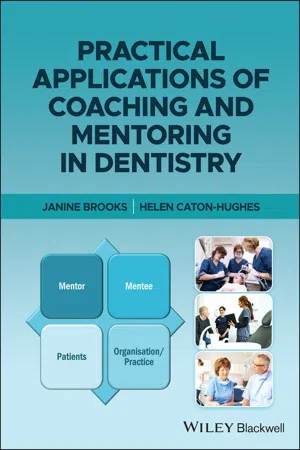
Practical Applications of Coaching and Mentoring in Dentistry
- English
- ePUB (mobile friendly)
- Available on iOS & Android
Practical Applications of Coaching and Mentoring in Dentistry
About This Book
PRACTICAL APPLICATIONS OF COACHING AND MENTORING IN DENTISTRY
Provides an understanding of the theory of coaching and mentoring with practical applications within the field of dentistry
Practical Applications of Coaching and Mentoring in Dentistry offers a comprehensive overview of the theory of coaching and mentoring as it applies to the field of dentistry.
The book includes practical case studies that demonstrate how dental professionals have implemented coaching and mentoring into their daily practice. Grouped into themes such as remediation, foundation training, outreach training, and specialist practice, it also explains the coaching and mentoring techniques chosen and applied. Core topics include:
- A thorough introduction to the mechanics of mentoring
- The characteristics of typical mentors, mentoring engagements and the different types of mentoring
- What mentoring can achieve
- An exploration of business coaching, including the difference between mentoring and coaching
- Discussions of the various types of models used within mentoring and coaching
Promoting the importance of coaching and mentoring, Practical Applications of Coaching and Mentoring in Dentistry highlights the positive impact and benefits, and is a valuable resource for dental professionals, dental organisations, and local dental committees.
Frequently asked questions
Information
1
Introduction
History
Activities such as coaching and mentoring, where individuals are supported by other members of the dental profession, also have an important role to play here, and are valuable ways of enhancing the skills and approach of all involved.Shifting the Balance: a better, fairer system of dental regulation(GDC 2017).
I suggest that a culture proactively supportive of practitioners at all stages of their careers using routine mentoring could do more than any amount of audit of techniques, protocols or choosing of ‘the latest’ materials, to enhance the quality of care delivered. Furthermore, because the dentist has a leadership role in the practising environment, the quality of performance of the dentist in the team can have a profound effect on the morale and culture of the team of which he or she is a part. This in turn will influence the quality of patient care indirectly as well as the direct effect through his/her own clinical performance(Holt 2013, p. 24).
There is also anecdotal evidence to suggest that Continuing Professional Development (CPD) which involves interaction with professional colleagues has significant benefits when compared with other non‐interactive activities, e.g. reading, or online CPD. While there is room for a mix of CPD activity, we all need to consider how to ensure that the benefits of interactive CPD are recognized and realised. Activities such as coaching and mentoring, where individuals are supported by other members of the dental profession, also have an important role to play here, and are valuable ways of enhancing the skills and approach of all involved(GDC Moving upstream 2020, p. 32).
Uses of Mentoring
Considering the widely varying circumstances and professional iso...
Table of contents
- Cover
- Table of Contents
- Title Page
- Copyright Page
- Dedication Page
- About the Authors
- List of Contributors
- Foreword
- Acknowledgements
- 1 Introduction
- 2 Mentoring
- 3 Coaching
- 4 The Forton Model
- 5 Practical Case Studies
- 6 Discussion
- Glossary of Terms – Organisations and Other Descriptors
- Further Reading
- Index
- End User License Agreement